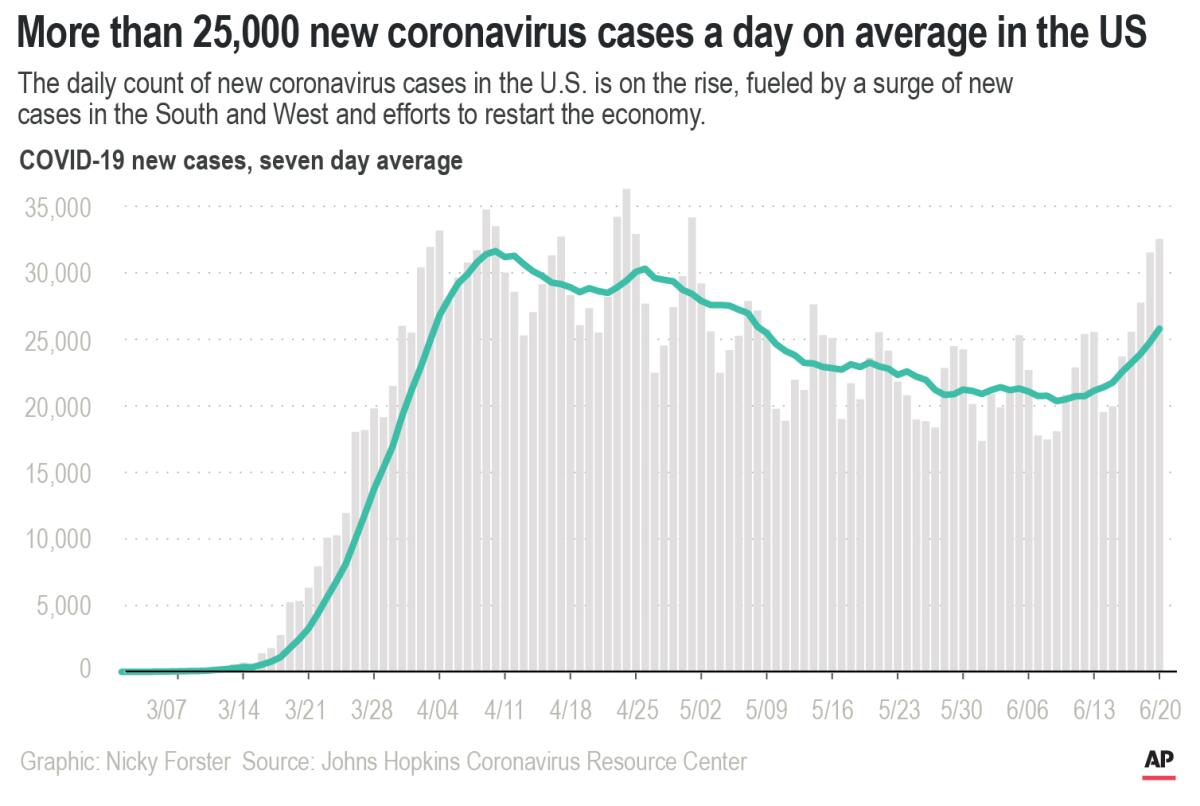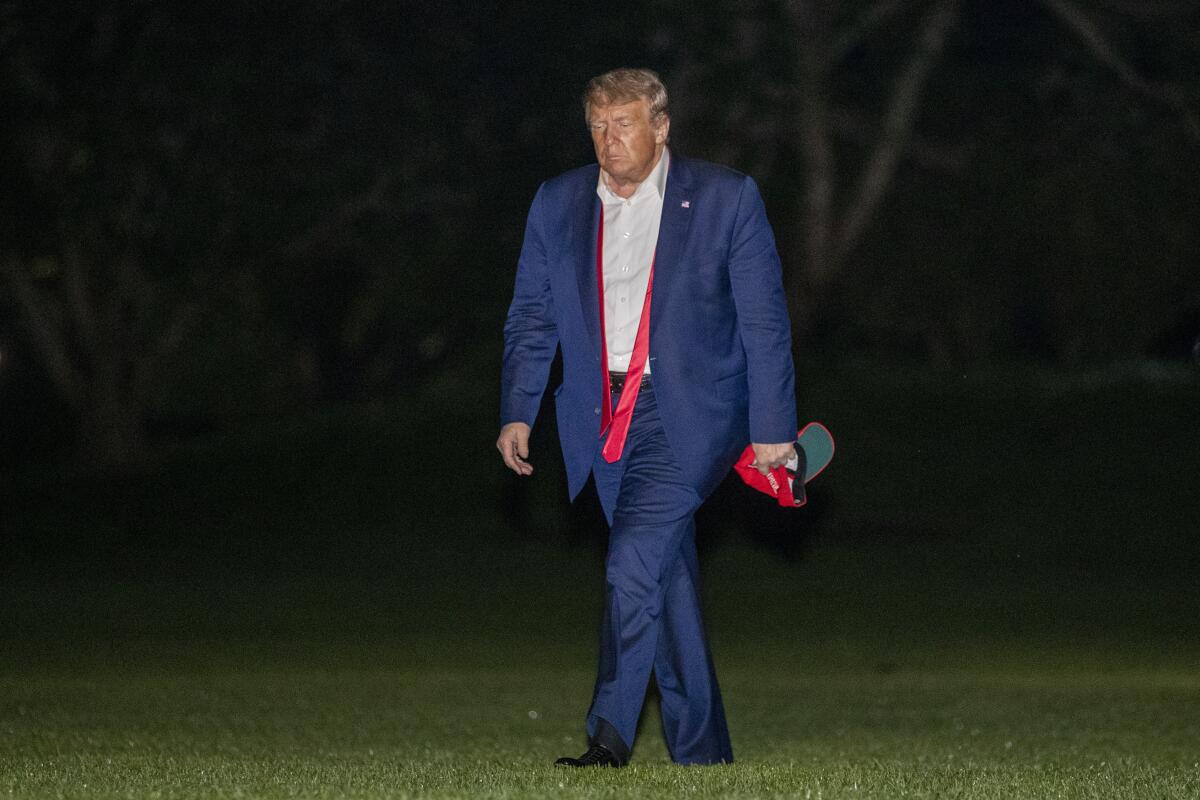Newsletter: A new COVID-19 surge

Experts warn that an increase in coronavirus cases in the South and Southwest of the U.S. poses a growing threat.
TOP STORIES
A New COVID-19 Surge
Infectious disease experts are expressing alarm over the pace of new coronavirus infections in several states in the South and Southwest, with one likening the spread in parts of the U.S. to a “forest fire.”
Start your day right
Sign up for Essential California for the L.A. Times biggest news, features and recommendations in your inbox six days a week.
You may occasionally receive promotional content from the Los Angeles Times.
With the United States now reporting a quarter of the world’s coronavirus cases, and daily counts of new infections exceeding 30,000 nationwide on at least two recent days, eight states — California among them — last week hit single-day new-case highs, according to figures compiled by Johns Hopkins University.
In California, much of the increase in the total number of cases does appear to be a result of more testing, health officials say, but that does not fully explain the overall caseload increase in several other states. That directly contradicts a major talking point by the president and some of his aides.
In some of the most affected states, such as Florida and Arizona, not only are larger proportions of tests coming back positive, but more of the afflicted are becoming sicker, said Thomas Inglesby of Johns Hopkins’ School of Public Health in an interview on “Fox News Sunday.”
Although death rates in the U.S. from COVID-19 have continued to decline after the peak hit in New York in April, the number of people hospitalized has climbed sharply in several states, and health officials fear that deaths could start rising again soon.
The World Health Organization on Sunday reported the largest single-day increase in coronavirus cases by its count, at more than 183,000 new cases worldwide in 24 hours. The U.N. health agency said Brazil led the way with 54,771 cases tallied and the U.S. next at 36,617.
More Top Coronavirus Headlines
— A cluster of mysterious deaths, some involving infants and children, is under scrutiny amid questions of whether the coronavirus lurked in California months before it was first detected. But eight weeks after Gov. Gavin Newsom declared a statewide hunt for undetected early COVID-19 deaths, the effort remains hobbled by bureaucracy and testing limits.
— L.A. County day camps for kids are a lifeline for working parents, but they’re struggling to adapt to new rules.
— In addition to our coronavirus tracker, The Times now has graphics showing how the coronavirus crushed California’s workforce.
Big Crowds? Not Exactly
As coronavirus cases rise, President Trump held a rally in Tulsa, Okla., on Saturday night where the crowd was in short supply and face coverings were even scarcer. The rally was Trump’s first in months, but it did not play out as the triumphant return to the campaign trail as the president and his supporters had envisioned.
Trump had no message of sympathy for those who lost friends and family in the pandemic, which has already killed 120,000 Americans. Instead, he complained that extensive testing was making the pandemic look worse.
“I said to my people, ‘Slow the testing down, please,’” he said, in what appeared to be a striking admission that he’s prioritized politics over accurately tracking the spread of the virus. Trump advisors said the president was only joking.
Despite the protests against racism and police brutality that have swept the nation in recent weeks, the president made scant reference to the issues raised by demonstrators. Trump did, however, lace his speech with racist comments, at one point calling the coronavirus, which originated in China, the “kung flu.”
He also gave an extended explanation for walking gingerly down a ramp after speaking at a West Point graduation ceremony. And in addressing a video of him apparently struggling to sip a glass of water, he theatrically took a sip of water and tossed the glass aside to cheers from the crowd, which chanted “four more years.”

The Councilman and ‘Relative A-1’
For years, Richelle Huizar stood by her husband, Jose Huizar, as his political star rose. She was seen as a strong contender to replace him on the Los Angeles City Council once he reached his term limit.
Now, as a federal investigation of City Hall corruption zeroes in on the councilman, filings by prosecutors raise questions about whether Richelle Huizar could be called to testify in a case targeting her husband.
Federal prosecutors have laid out a devastating series of allegations against Councilman Huizar, portraying him in court filings as the head of a criminal scheme who used bribes and other illegal tactics to enrich himself and maintain his grip on power. In those filings, “Relative A-1” — whose biographical details all match up with Richelle Huizar — has appeared repeatedly, but whether she knew of any criminal activity is not clear.
Neither Huizar nor his wife has been arrested or publicly charged. Attorney Alyssa Bell, who is representing Richelle Huizar, declined to answer questions about the case, saying her client is “not comfortable speaking publicly at this stage.” Lawyers for Jose Huizar declined to comment.
A Demand for Answers
Hundreds of demonstrators gathered in Gardena on Sunday to demand justice for Andres Guardado, an 18-year-old Latino man fatally shot Thursday by a Los Angeles County sheriff’s deputy. Sheriff’s officials said Guardado was armed and had fled from deputies, but have not said what prompted the shooting.
“He ran because he was scared,” one of the protesters’ signs read. “Why’d you kill that kid?” the crowd chanted.
Protesters marched down West Redondo Beach Boulevard, where Guardado was shot, filling the street as they headed toward the sheriff’s station in Compton more than three miles away. There, protesters and sheriff’s deputies engaged in a tense standoff, with authorities using what appeared to be tear gas to disperse a small group who had broken off from the otherwise peaceful demonstration.
OUR MUST-READS FROM THE WEEKEND
— How two Black women in L.A. helped build Black Lives Matter from hashtag to global movement.
— Columnist Steve Lopez: “Nearly 50 years later, he hasn’t forgotten the ugly racial incident, and neither have I.”
— These two L.A. chefs aren’t staying quiet. Their meals are fueling a revolution against racism.
— When we were quarantined: Diaries from 17 writers in isolation.
FROM THE ARCHIVES
On this day in 1947, just after 2 a.m., a series of explosions sank the tanker Markay. A dozen workers were killed and 22 injured. A story in the next morning’s Times, along with some dramatic photos, reported:
“Los Angeles Harbor was rocked by a series of tremendous blasts yesterday when an oil tanker blew up, killing at least two persons and causing fires, that, fed by spreading gasoline, consumed five shipping berths and parts of two others, besides oil-loading equipment and sheds.”
A followup article in the July 3, 1947, Times reported a coroner’s jury decided there was “no evidence of negligence” and said the Markay sinking was accidental.

CALIFORNIA
— For decades, law enforcement unions have held powerful sway over local and state politicians, wielding the cash and clout to punish those who crossed them and to reward those who didn’t. Now, the power of the state’s police unions has been severely diminished.
— At Father Serra Park in downtown L.A., just south of Olvera Street, a group of young activists bound the nearby statue of Father Junipero Serra with ropes and tore it off its pedestal to chants of “Take it down! Take it down!”
— Rep. Adam B. Schiff has withdrawn his endorsement of Los Angeles County Dist. Atty. Jackie Lacey ahead of a contentious November election, when she will seek a third term in office.
— Quartz Hill High School in the Antelope Valley is dropping its Rebel mascot. It’s a move that some say is long overdue.
Support our journalism
Subscribe to the Los Angeles Times.
NATION-WORLD
— Trump fired Geoffrey Berman, the U.S. attorney for the Southern District of New York who has overseen sensitive investigations into the president’s allies. After initially refusing to step down, Berman announced he was leaving office immediately, citing Atty. Gen. William Barr’s decision to name the office’s top deputy, Audrey Strauss, as acting U.S. attorney.
— Out of its coronavirus lockdown, Europe is begging tourists to return. “We want to turn the page, forget this disease, which we have beaten, and get back to normal at Versailles. This is important because we want to say to American tourists: ‘Please come back,’” said Catherine Pegard, who runs the palace of Versailles.
— Above the Arctic Circle, a town in Siberia with the world’s widest temperature range has recorded a new high of 100.4 degrees amid a heat wave that is contributing to severe forest fires.
HOLLYWOOD AND THE ARTS
— Five women have given detailed allegations of sexual improprieties by comedian Chris D’Elia. He issued a statement saying he had “never knowingly pursued any underage women” and that all of his relationships had been “both legal and consensual.”
— Inside “The Last of Us Part II,” the year’s most anticipated — and targeted — game: violence, a virus and an LGBTQ love story.
— When are museums reopening in California? Some already have. Here’s the list.
— HBO has given Perry Mason a superhero’s origin story. TV critic Robert Lloyd says the character didn’t need one.
BUSINESS
— The Trump administration is apparently relenting to public pressure and pledging to provide more details about which small businesses received loans from a $600-billion-plus coronavirus aid program. But government watchdogs say even more transparency is needed.
— Black-owned businesses face a system set up against them. COVID-19 makes it worse.
SPORTS
— A noose was found hanging in Bubba Wallace’s garage stall at Talladega Superspeedway, and NASCAR has launched an immediate investigation into the incident. It occurred less than two weeks after Wallace, who is Black, called for NASCAR to ban the Confederate flag at its races and NASCAR followed suit.
— Race and the NFL: A star-studded panel discusses social change and protests.
— Max Tuerk, an All-American center at USC who was drafted by the San Diego Chargers in 2016, has died at 26, the university announced. A statement from his family said he died while hiking with his parents in the Cleveland National Forest.
Free online games
Get our free daily crossword puzzle, sudoku, word search and arcade games in our new game center at latimes.com/games.
OPINION
— Defund the school police? It’s not that simple, The Times’ editorial board writes.
— COVID-19 restrictions prevent lawyers from visiting clients in prison. Legislation could end the unjust policy that requires inmate-attorney emails to be monitored.
WHAT OUR EDITORS ARE READING
— Former Trump national security advisor John Bolton condemned his presidency as dangerously damaging to the United States and argued the 2020 election is the last “guardrail” to protect the country from him. (ABC News)
— In pictures: The “ring of fire” solar eclipse cast its shadow over Africa, Asia and the Middle East. (The Guardian)
ONLY IN L.A.
At first, the founder of a new nonprofit in Pico-Union offered community yoga classes, but no one showed up. At first, he had flowers from his San Fernando Valley garden planted up and down the sidewalks and assumed that the neighborhood would be delighted. He was stunned to come back and find some of the plants unceremoniously ripped out. From the moment he arrived there seven years ago, Craig Taubman sincerely wanted to help the people of this poor, densely populated downtown neighborhood. But he soon realized he needed to listen to the community before trying to help.
Comments or ideas? Email us at [email protected].
Sign up for Essential California
The most important California stories and recommendations in your inbox every morning.
You may occasionally receive promotional content from the Los Angeles Times.



